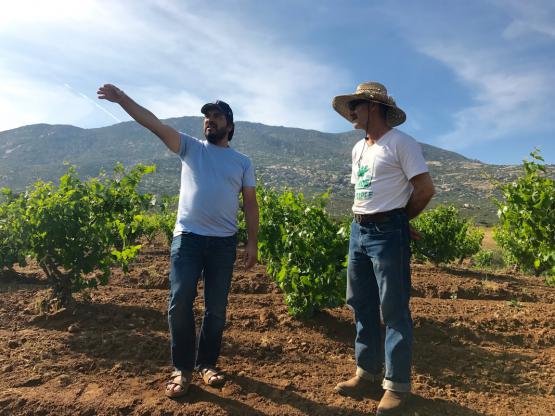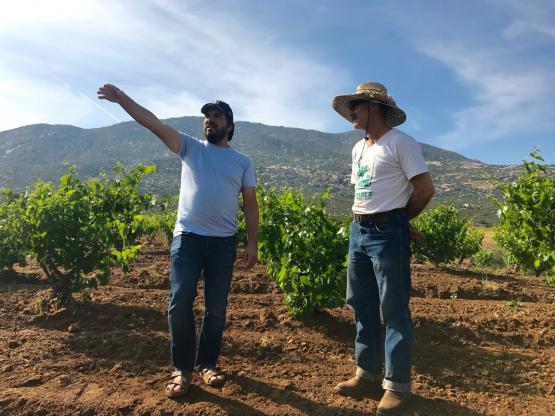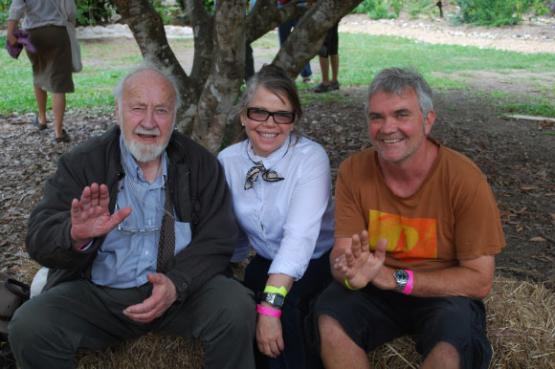
An Interview with Bichi Winery’s Noel Téllez
4 min read
By Verve Wine owner Dustin Wilson

Dustin Wilson: Bichi is a young winery, planting your home vineyard in 2004 and bottling your first vintage in 2014. During this time, what have you learned about the terroir of Tecate and how would you describe the terroir to others?
Noel Téllez: As you may know, we are farming 24 acres of our own vineyards. These are now being farmed biodynamically. The soils are different within the farm, some slopes and valleys are composed of granite, quartz and clay, whereas in the valleys we have deeper sandy loam soils. We are just beginning to understand the terroir of our place. At the beginning we just planted by mere excitement and not very much knowledge and the practices we used for agriculture were conventional. Since five years ago we move to organic farming and three years ago we moved to biodynamic in a move to understand the soils and plants much better. We have just completed three harvests like that, and so far the results are great. We have a long way to go to understand our soils better, but at least now we know we are on the right track.
As for the rest in Tecate. We go back to the history of the town. In the 30’s it was fully planted with Mission, Palomino and Rosa del Peru grapes. Now we are working with a vineyard that is a reminiscent of that. Is a hundred year all vineyard with all these grapes, dry-farm. Again the soils are decomposed granite with sandy soils. Most of these vineyards are located close to the belts of live oak trees, so normally these places have a lot of water under the soil, which is no the case in the lower valley of Baja.
The vineyards where we work in Tecate have an elevation of 2000 to 2500 feet, and we have hot summers and cold winters. We get cold fresh nights during summer, whereas in the other valley’s not.
DW: Are there specific other producers out there in the world that inspire your winemaking?
NT: Oh Yeah!, Lapierre, Foillard, Foradori, Ochipinti, Tom Lubbe, Oriol Artigas, Alfredo Maestro, Gravner, Dario Princic, and many others.
DW: You work with the Mission grape in Tecate. What is it like working with this variety, how does it behave (in the vineyard and the winery), and how would you describe its flavor profile?
NT: We love to work with this variety. We believe has a lot to tell, its simplicity is its complexity. In the vineyard it is a survivor, no wonder why it was pervaded throughout America. We work with these vineyards that used to be abandoned by farmers but they are adapted so well to this climate that they survive. We have traveled to Peru, Chile and Canary Islands and saw the same varieties there and how they perform. We love to see the different terroirs of this grape and how it expresses in each place. Even here in Baja we see the differences of the mission grape of Tecate and other valleys. By default these vineyards are farmed organically, because the farmers who have these grapes normally see them as a lost, hence they don’t want to invest anything on them, and normally they give the minimum ( pruning, tilling or no tilling) so we are trying to change that by letting them know that we are committed to work with these grapes that normally no one else care about. In a way we are building a network of farmers that now see the value of these grapes and with time we will be able to change and instate a better agriculture for these vineyards.
In the winery this variety works very well, and we like to experiment with different ways of making wine with it.
DW: Your labels are fantastic. Who does the artwork and what inspires each of the illustrations?
NT: The artist is my brother’s Jair father in law. His name is Daniel Pezzi and is an Argentinean living in Dominican republic who is an illustrator and painter. He has a very keen sense of humor and has been there with us from the beginning of the project. The labels came out like a statement mostly for mexican wine industry that we wanted to have other kind of wine in Mexico, that’s why we avoided seriousness on the labels, we wanted something Mexican, not shy, something that was totally different to the labels that were normally produced for wine in Mexico. Also we wanted to distance ourselves from what was made from the wine industry of Mexico.
The name Bichi means naked in a native language from Sonora, our birth state.
DW: What are the best markets for your wines?
NT: U.S.A. is our main market. Los Angeles and Bay area are doing fantastic. Denmark just imported Bichi. Mexico city, sure is a good market too. So far those places is where we have our wines. Other places have shown interest also, like Canada, Spain, France, but we are in the process of making available for them too.
DW: What are you most excited about for your trip to NYC?
NT: Well, we never imagined our wines will be there, at least so soon. We are super happy to be in NY, for we know that is the place to be. We are excited and can’t wait to be there.
DW: What other natural wine producers do you enjoy drinking?
NT: Foradori, Oriol Artigas, Alfredo Maestro, Envinate, Chida, Guy Breton, Tom Lube, Lapiere, Louis-Antoine Luyt, and lot of guys from Loire, Jura in France. We enjoy to try always new things, unfortunately so far they are mostly from other countries and not Mexico. There is a guy though, that makes very good wine in San Antonio de las minas, Baja (Humberto Toscano) we love his wines too.


